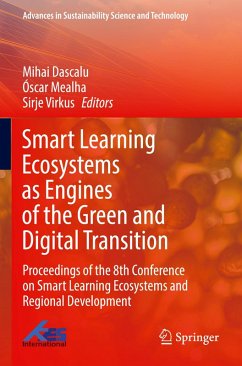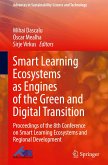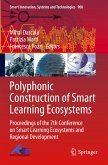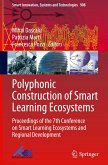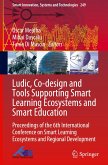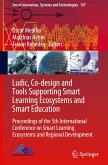Smart Learning Ecosystems as Engines of the Green and Digital Transition
Proceedings of the 8th Conference on Smart Learning Ecosystems and Regional Development
Herausgegeben:Dascalu, Mihai; Mealha, Óscar; Virkus, Sirje
Smart Learning Ecosystems as Engines of the Green and Digital Transition
Proceedings of the 8th Conference on Smart Learning Ecosystems and Regional Development
Herausgegeben:Dascalu, Mihai; Mealha, Óscar; Virkus, Sirje
- Broschiertes Buch
- Merkliste
- Auf die Merkliste
- Bewerten Bewerten
- Teilen
- Produkt teilen
- Produkterinnerung
- Produkterinnerung
The book brings together the contributions of the 8th International Conference on Smart Learning Ecosystems and Regional Development aimed at promoting reflection and discussion on the relevance of smart learning ecosystems for regional development and social innovation (e.g., schools, campuses, working places, informal learning contexts) and on how the effectiveness of the relation of citizens and smart ecosystems can be boosted. This forum is interested in understanding how technology-mediated instruments can foster the citizen's engagement with learning ecosystems and territories, namely by…mehr
Andere Kunden interessierten sich auch für
![Smart Learning Ecosystems as Engines of the Green and Digital Transition Smart Learning Ecosystems as Engines of the Green and Digital Transition]() Smart Learning Ecosystems as Engines of the Green and Digital Transition186,99 €
Smart Learning Ecosystems as Engines of the Green and Digital Transition186,99 €![Polyphonic Construction of Smart Learning Ecosystems Polyphonic Construction of Smart Learning Ecosystems]() Polyphonic Construction of Smart Learning Ecosystems149,99 €
Polyphonic Construction of Smart Learning Ecosystems149,99 €![Polyphonic Construction of Smart Learning Ecosystems Polyphonic Construction of Smart Learning Ecosystems]() Polyphonic Construction of Smart Learning Ecosystems149,99 €
Polyphonic Construction of Smart Learning Ecosystems149,99 €![Ludic, Co-design and Tools Supporting Smart Learning Ecosystems and Smart Education Ludic, Co-design and Tools Supporting Smart Learning Ecosystems and Smart Education]() Ludic, Co-design and Tools Supporting Smart Learning Ecosystems and Smart Education134,99 €
Ludic, Co-design and Tools Supporting Smart Learning Ecosystems and Smart Education134,99 €![Ludic, Co-design and Tools Supporting Smart Learning Ecosystems and Smart Education Ludic, Co-design and Tools Supporting Smart Learning Ecosystems and Smart Education]() Ludic, Co-design and Tools Supporting Smart Learning Ecosystems and Smart Education134,99 €
Ludic, Co-design and Tools Supporting Smart Learning Ecosystems and Smart Education134,99 €![Ludic, Co-design and Tools Supporting Smart Learning Ecosystems and Smart Education Ludic, Co-design and Tools Supporting Smart Learning Ecosystems and Smart Education]() Ludic, Co-design and Tools Supporting Smart Learning Ecosystems and Smart Education112,99 €
Ludic, Co-design and Tools Supporting Smart Learning Ecosystems and Smart Education112,99 €![Ludic, Co-design and Tools Supporting Smart Learning Ecosystems and Smart Education Ludic, Co-design and Tools Supporting Smart Learning Ecosystems and Smart Education]() Ludic, Co-design and Tools Supporting Smart Learning Ecosystems and Smart Education112,99 €
Ludic, Co-design and Tools Supporting Smart Learning Ecosystems and Smart Education112,99 €-
-
-
The book brings together the contributions of the 8th International Conference on Smart Learning Ecosystems and Regional Development aimed at promoting reflection and discussion on the relevance of smart learning ecosystems for regional development and social innovation (e.g., schools, campuses, working places, informal learning contexts) and on how the effectiveness of the relation of citizens and smart ecosystems can be boosted. This forum is interested in understanding how technology-mediated instruments can foster the citizen's engagement with learning ecosystems and territories, namely by understanding innovative human-centric design and development models/techniques, education/training practices, informal social learning, innovative citizen-driven policies, technology-mediated experiences, and their impact. This set of concerns contributes to fostering the social innovation sectors and ICT, economic development, and deployment strategies alongside new policies for smarter proactive citizens.
Produktdetails
- Produktdetails
- Advances in Sustainability Science and Technology
- Verlag: Springer / Springer Nature Singapore / Springer, Berlin
- Artikelnr. des Verlages: 978-981-99-5539-8
- 1st ed. 2023
- Seitenzahl: 288
- Erscheinungstermin: 27. September 2023
- Englisch
- Abmessung: 235mm x 155mm x 16mm
- Gewicht: 441g
- ISBN-13: 9789819955398
- ISBN-10: 9819955394
- Artikelnr.: 68382173
- Herstellerkennzeichnung Die Herstellerinformationen sind derzeit nicht verfügbar.
- Advances in Sustainability Science and Technology
- Verlag: Springer / Springer Nature Singapore / Springer, Berlin
- Artikelnr. des Verlages: 978-981-99-5539-8
- 1st ed. 2023
- Seitenzahl: 288
- Erscheinungstermin: 27. September 2023
- Englisch
- Abmessung: 235mm x 155mm x 16mm
- Gewicht: 441g
- ISBN-13: 9789819955398
- ISBN-10: 9819955394
- Artikelnr.: 68382173
- Herstellerkennzeichnung Die Herstellerinformationen sind derzeit nicht verfügbar.
Mihai Dascalu is a professor at the University Politehnica of Bucharest with a strong background in Computer Science applied to Education. He has extensive experience in national and international research projects with more than 300 published papers, including 30 articles at top-tier conferences, 100+ papers indexed by ISI at renowned international conferences, and 10+ Q1 journal papers. Complementary to his competencies in NLP, technology-enhanced learning, and discourse analysis, Mihai holds a multitude of professional certifications and extensive experience on strategic projects on non-refundable funds. Moreover, Mihai obtained a Senior Fulbright scholarship in 2015, has become a Fulbright ambassador since 2018, and holds a US patent. Mihai is also a corresponding member of the Academy of Romanian Scientists. Óscar Mealha is a full professor at the Department of Communication and Art, University of Aveiro (UA), Portugal. He develops his research at DigiMedia Research Centre/UA, in the area of "Information and Communication in Digital Platforms" in the context of "Knowledge Media and Connected Communities" with several projects, masters and doctoral supervisions, and publications on interaction design and analysis techniques and methods, namely for UX design and evaluation, usability evaluation, and visualization of interaction/infocommunication activity. He is involved in infocommunication mediation projects such as "Unified Communication & Collaboration" with IT companies, "Visualization of Open Data Dashboards for Citizen Engagement and Learning" in municipalities and smart territories, and "Knowledge Interface School-Society (KISS)" with school clusters within the scientific network ASLERD. He is currently the director of 2 doctoral programs: one on New Media and the other on Information and Communication in Digital Platforms, a joint program of the University of Aveiro and University of Porto. Sirje Virkus is a professor of Information Science and Head of the Study Area of Information Sciences at the School of Digital Technologies at Tallinn University. She holds a Ph.D. in Information and Communication Studies from the Manchester Metropolitan University. She has an extensive experience working with educational innovation and research in the higher education sector in Estonia. She was one of the initiators and teachers of the international collaborative Erasmus Mundus MA program Digital Library Learning (DILL) (2007-2020). Her research interests are focused on the development of information-related competencies (data literacy, information literacy, digital literacy, media literacy), ICT innovation in education, and internationalization. She has written more than 250 research publications. She belongs to the editorial board of several high-quality scientific journals and conference program committees and book series. She has received the State Decoration with the Order of the White Star (4th Class) of the Estonian President in 2021 and appointed as an alumni of the Century of Tallinn University (among 100 people who have made a significant contribution to the development of Estonian society, education, and culture) in 2019.
Part I: Fostering Intelligent Education and Smart Cities.- Academic Staff Perceptions and Attitudes Towards Learning Analytics.- Enhancing Load Evaluation in Intelligent Tutoring Systems through Velocity-Based Training.- Intelligent Tutoring System and Learning: Complexity and Resilience.- How Cities Can Learn: Key Concepts, the Role of ICT, and Research Gaps.- Smart Cities and Smart Regions Roadmap.- Part II: Telepresence Technology in Education.- TelePresence - Social Justice for the Online "Other"?.- HoloLearn: Towards a hologram-mediated hybrid education.- Using telepresence robots for remote participation in technical subjects in higher education.- Part III: Digital Transformation in Education.- The Transformation of Art Teaching Process: A Qualitative Study of Digital Mediated Teaching.- Digital Turn in Social Work Education and Practice.- Sustainable digital transition with students' experience and smartphones at D. Maria II school cluster.- An Evaluation of Participatory Videoas Teaching Digital Storytelling against Climate-driven Inequalities.- Part IV: Exploring Game-Based Learning and Gamification in Education.- Implementation of Minecraft in Education to Introduce Sustainable Development Goals: Approaching Renewable Energy through Game-based Learning.- A Systematic Mapping Review of Research Concerning the Use of Games in Teacher Training.- Unplugging Math: Integrating Computational Thinking into Mathematics Education Through Poly-Universe.- Design of an Adaptive Hybrid Gamification Teaching Method and Its Practice in Computer Science and Animation Teaching.
Part I: Fostering Intelligent Education and Smart Cities.- Academic Staff Perceptions and Attitudes Towards Learning Analytics.- Enhancing Load Evaluation in Intelligent Tutoring Systems through Velocity-Based Training.- Intelligent Tutoring System and Learning: Complexity and Resilience.- How Cities Can Learn: Key Concepts, the Role of ICT, and Research Gaps.- Smart Cities and Smart Regions Roadmap.- Part II: Telepresence Technology in Education.- TelePresence - Social Justice for the Online "Other"?.- HoloLearn: Towards a hologram-mediated hybrid education.- Using telepresence robots for remote participation in technical subjects in higher education.- Part III: Digital Transformation in Education.- The Transformation of Art Teaching Process: A Qualitative Study of Digital Mediated Teaching.- Digital Turn in Social Work Education and Practice.- Sustainable digital transition with students' experience and smartphones at D. Maria II school cluster.- An Evaluation of Participatory Videoas Teaching Digital Storytelling against Climate-driven Inequalities.- Part IV: Exploring Game-Based Learning and Gamification in Education.- Implementation of Minecraft in Education to Introduce Sustainable Development Goals: Approaching Renewable Energy through Game-based Learning.- A Systematic Mapping Review of Research Concerning the Use of Games in Teacher Training.- Unplugging Math: Integrating Computational Thinking into Mathematics Education Through Poly-Universe.- Design of an Adaptive Hybrid Gamification Teaching Method and Its Practice in Computer Science and Animation Teaching.

